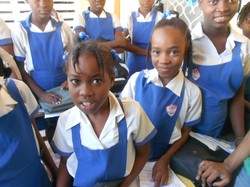After the 2010 earthquake in Haiti, millions of dollars, thousands of aid workers, and hundreds of nonprofits poured into the country in an effort to help those affected by the disaster. But, as we’ve learned in the years since, not all disaster aid is created equal.
Some projects failed. Monies sent for Haitians were not necessarily making it to those with the greatest need. The international community began to notice and asked what was really happening to improve the lives of the most marginalized.
Such problems emphasize just how critical Presbyterian Disaster Assistance’s longtime partnership with Church World Service (CWS) is to Haitians' who need help. CWS works with partners in the U.S. and around the world to build interfaith and intercultural coalitions to eradicate hunger and poverty and promote peace and justice. They have staff on the ground in Haiti working directly with Haitian organizations to ensure projects effectively address the needs of the most marginalized.
“What many people don’t understand is that there are strong community leaders all across Haiti,” Donna Derr, director of the CWS Emergency Response Program, said during a recent trip to Haiti. “There is just often a gap between these community leaders and government.”
The Presbyterian Haiti Response Team (HRT), which was formed to decide how funds raised for disaster relief were spent, provided an unrestricted grant to CWS to fund their projects in Haiti. In February 2012, CWS representatives invited support organizations, including members of the HRT, to see what work had been accomplished, assess current programs for donors, and meet with leaders of local groups.
The organizations supported by CWS are focused on a myriad of complicated and serious issues for Haitians—from providing agricultural support and funding for farming communities to taking on the restavek system in Haiti.
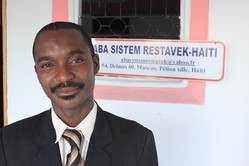
Salomon Jean, President of the ASR Network. The organization seeks to end the Haitian practice of restavek - a system where children are used for manual labor and often suffer severe physical and mental abuse. —Aaron Tate, Church World Service
Restavek is a practice in Haiti in which children are sent to work as domestic servants by their parents. Often the parents, who usually live in rural areas, are promised their children will be provided an education and opportunities, so they believe they are doing something good. But in reality the children are neglected and abused.
“The children have no means to communicate with their families, so they never know the misery their children are suffering,” Salomon Jean, the president of the ASR Network, told us.
The ASR Network (Aba Sistèm Restavèk, “Down with the Restavek System”) has worked with CWS to provide training for Haitians to spot signs of restavek and to educate the populace about the issue. There are currently 15 grassroots organizations that are part of the ASR Network, including the Organization of Young Girls in Action (OJFA), founded by Nadine Francis.
“We are all here as brothers and sisters of God,” Francis said. “How can you see your brother or sister in such a situation and cross your arms and not help? Sometimes I’m sad because there is only so much I can do. Everybody deserves a better life.”
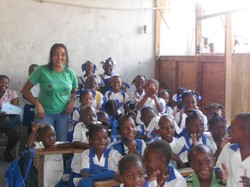
Nadine Francis, the head of the Organization of Young Girls in Action school school (OJFA) in Port-au-Prince, Haiti, poses among her students —Jessica Reid, Communications Associate
Francis provides education and shelter for children who were part of the restavek system. She took those invited to tour the school from classroom to classroom. Each time, the students would cheer and wave and smile, excited to see Francis. Many would hug her when she approached them, the love for her evident on their faces.
“These children were made to work hard. They had to get water and more just so they could have a little bit to eat,” she told us as she took a moment to hug and encourage each student near her.
OJFA will be 10 years old in 2013. Most of the organizations funded by CWS had been helping Haitians for years when the 2010 disaster that brought so much attention to Haiti struck.
“These were all things we cared about long before the earthquake, but because of the disaster we are trying to do even more and make our dollars stretch even further to help those most in need,” said Jason Knapp, a member of the CWS team.
One of the programs that addresses the needs of the most marginalized is Service Chretien d’Haiti (SCH). The program provides psychosocial and financial support to people with disabilities in Haiti who are or want to be business owners.
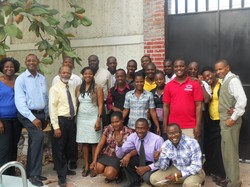
More than two dozen “monitors” (pictured here) provide support and training to disabled business owners in Haiti as part of a Service Chretien d’Haiti program supported by CWS and partly funded by Presbyterian donations. —Jessica Reid, Communications Associate
The “people with disabilities” program, as it’s referred to, not only helps disabled business owners but its positive effects are multiplied because many of those businesses provide jobs for others. In addition, SCH employs about two dozen monitors (see group photo) who work directly with the business owners. Those monitors go through business training, learn sign language, and study the unique psychology of disabled people so they can provide psychosocial support.
“They themselves [the disabled] have withdrawn from society because society was denying support,” Ernst Abraham, executive secretary of SCH, told us. “They leave their families because they expect to be put out. We must reintegrate these people into society.”
In Haitian culture, a disability is often seen as a curse, but because so many were injured in the earthquake, such views are changing. Those at SCH see that as an opportunity.
“We must move from integration to inclusion,” Jacques N. Muscadin, a member of SCH, said. “Inclusion is more than a person standing next to us. Each person is also participating by living among us and taking part, going to school, and contributing to our society and community.”
Thanks to CWS’s support, SCH helped 1,200 business owners with monthly financial support, provided 573 people with capital to repair or restart a business, and helped another 300 people with disabilities meet miscellaneous needs.
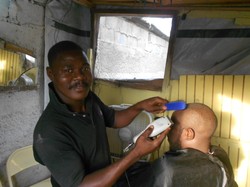
John Rony Teudy is one of the many Haitian business owner helped through the Service Chretien d’Haiti program partly funded by Presbyterian donations.
The programs funded through Church World Service are important examples of why Presbyterians believe in working with partners to better serve Christ’s people. For the people in Haiti helped through SCH and programs like it, it’s a blessing from God.
“I love Service Chretien d’Haiti! God sent them to me,” said Sainte Elaine Cimus, a Haitian business owner. “I was selling peanuts and could not continue. The money God sent me through them made it possible for me to do better.”
“I am happy and thank Jesus for the people who helped me without having ever met me,” John Rony Teudy, a Haitian business owner, told us. “So, I hope God will help and watch over each one of them.”

